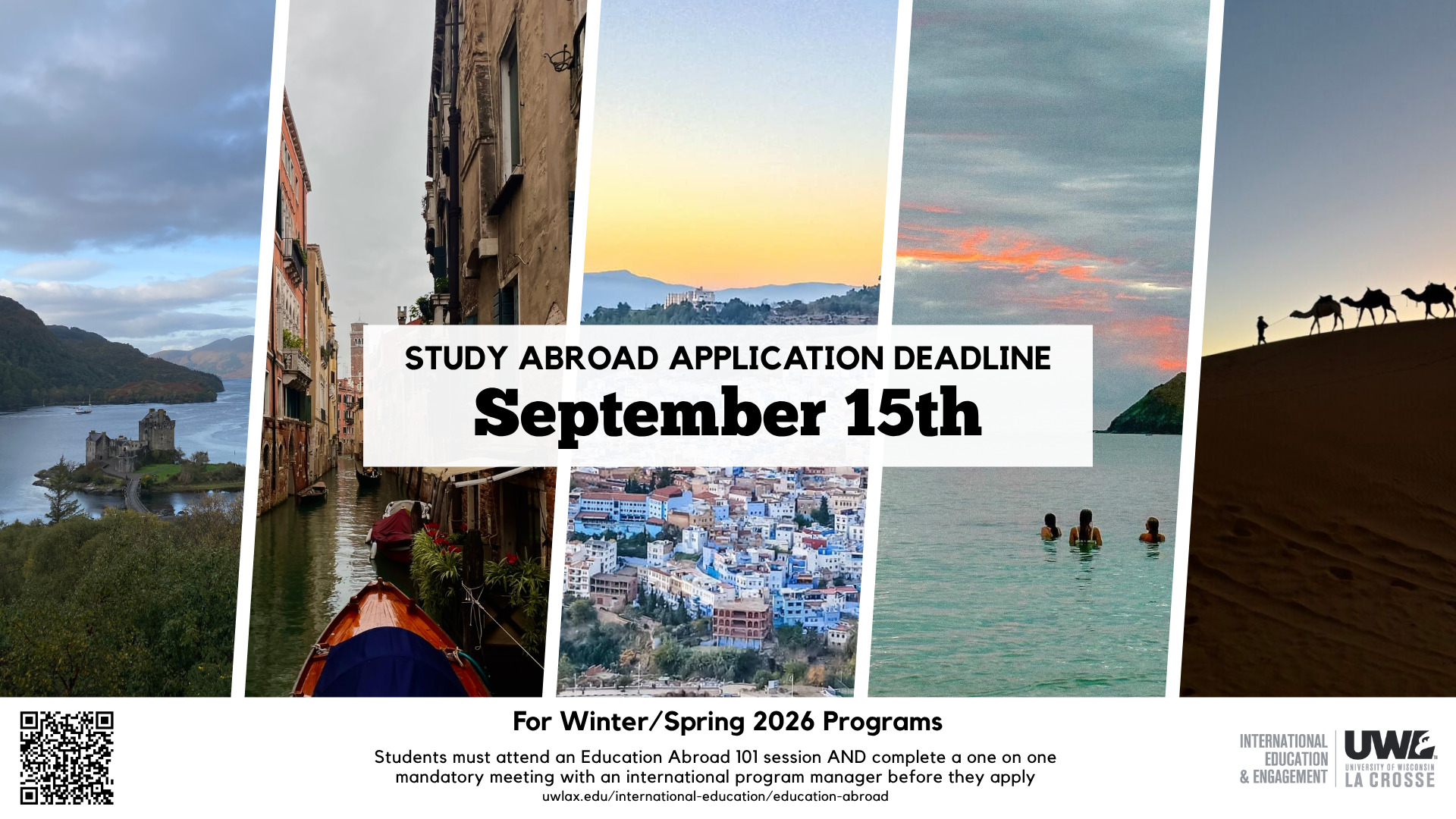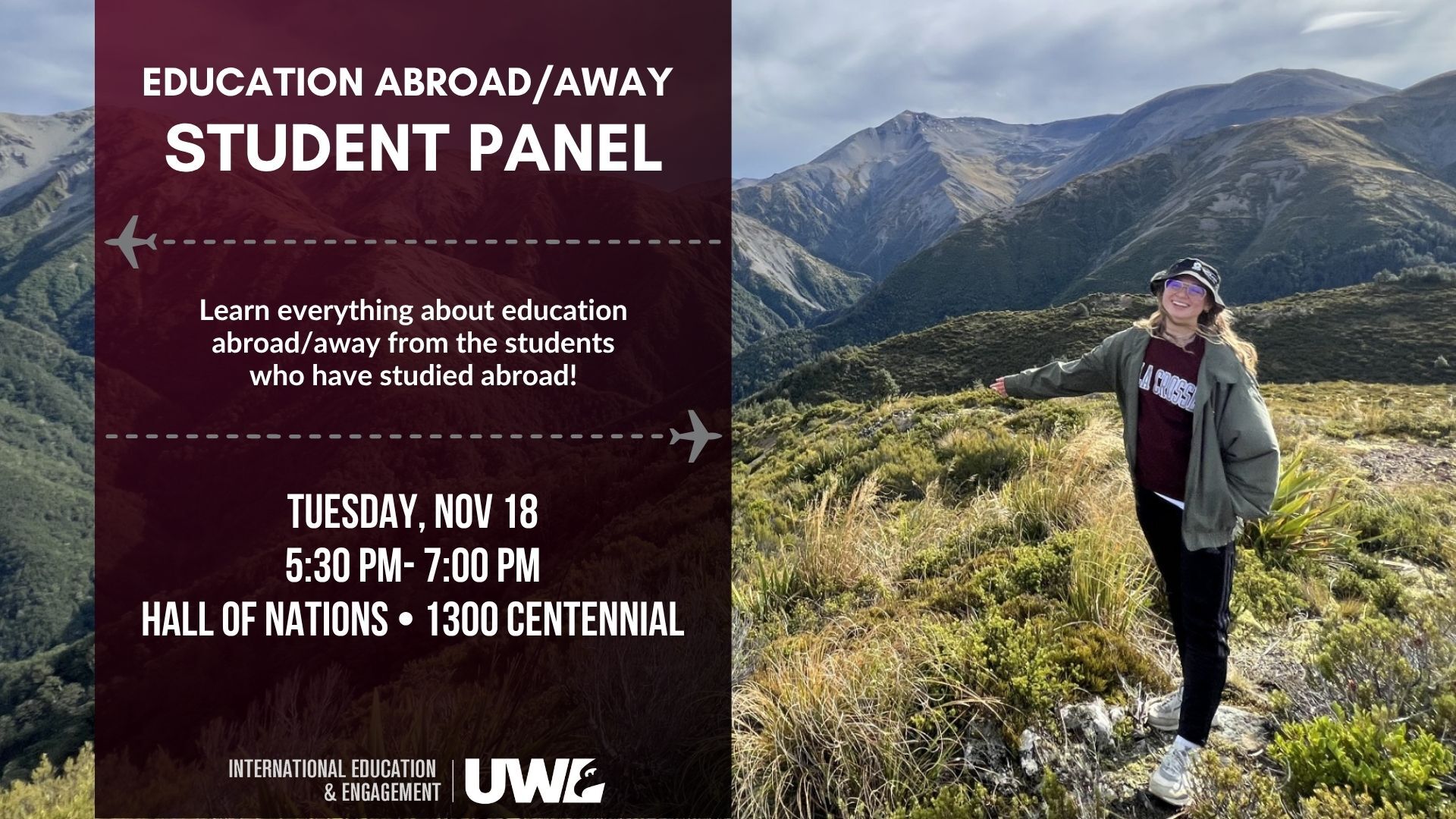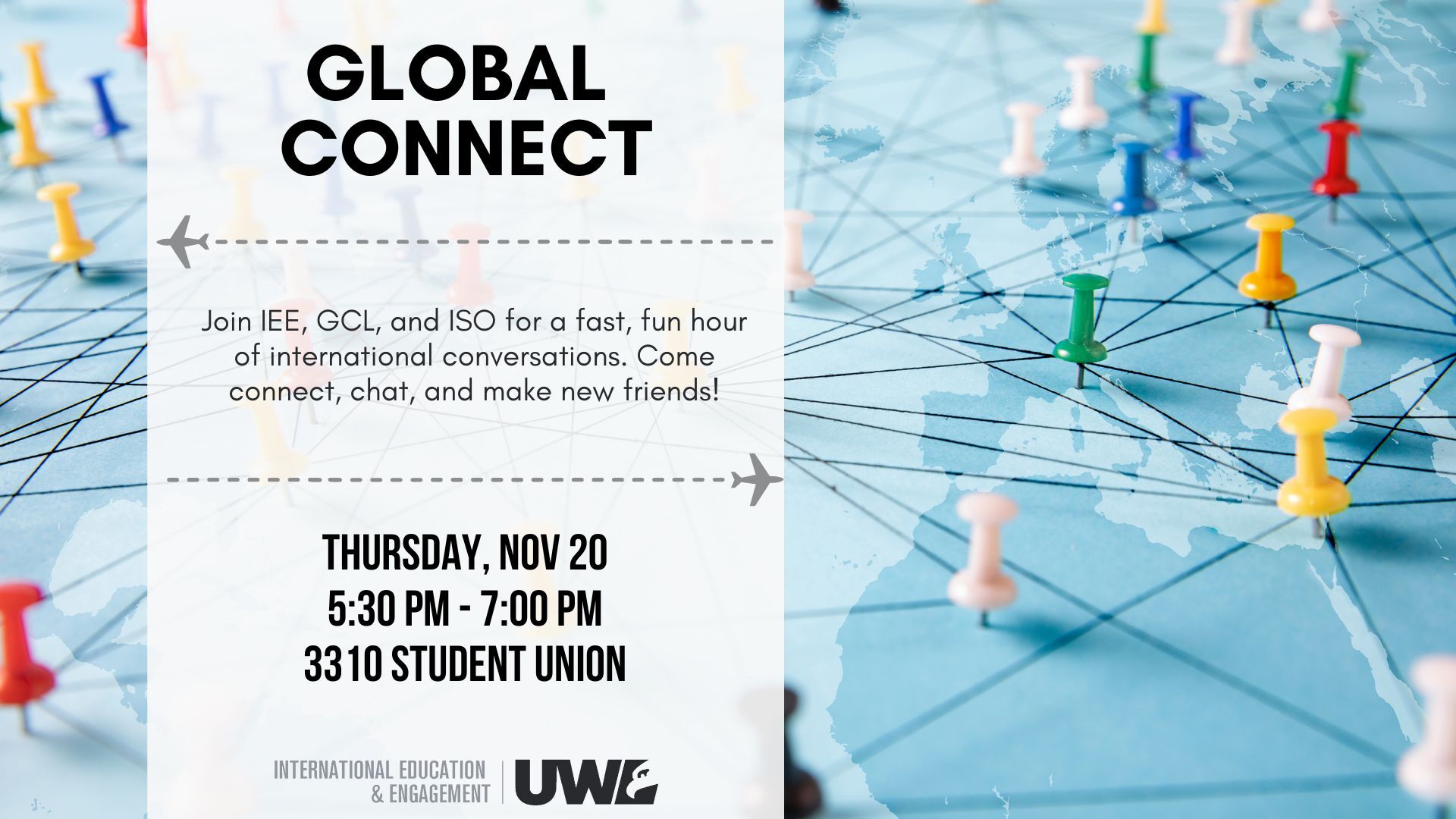Parents & families
A page within International Education & Engagement
Dear Parent/Guardian/Friend,
It is with great pleasure that we extend a tremendous “thank-you” for assisting your student(s) in making, what will inevitably be, one of the most significant decisions of their life. Participating in an international experience is not only challenging and life-changing, but also extremely rewarding and beneficial. While the trend for an experience abroad continues to become more and more popular in the United States, it remains true that still less than 5% of U.S. college students make it a part of their academic experience. This means that your student(s) will truly be in a different league than 95% of their peers when looking for employment after college!
Studying in another country offers students an opportunity to learn about a new culture and meet people from all over the world, while earning credits that will help them complete their graduation requirements. Currently UW La Crosse offers over 150 programs in more than 45 countries through partnerships and affiliations. This means that no matter what a student’s major or minor is there is a program that will work for them.
Whether your student is just beginning the process or they have already arrived in their host country, I hope that you will be able to use the information included in this section to answer questions or simply ease your mind. If after consulting the following information a question still exists, please do not hesitate to contact IEE at 608-785-8016. We are here to assist you in any way that we can.
Again, thank you for supporting your student during this incredible journey!
Warmest Regards,
IEE Team
Resources:
USA Study Abroad: Information for parents
Why Education Abroad?
Participating in an education abroad program is one of the best ways to help your student develop. Independence, self-confidence, and maturity as well as the ability to adapt creatively to adverse situations and interact with people from a wide variety of cultures are only some of the benefits of an international experience. The skills they will gain will aid them throughout their life. In our ever changing world and the increasingly expanding global economy, employers, governments, and academia are recognizing the importance of having an international experience and looking to employ globally competent citizens. Education abroad is truly an investment in your student’s future.
How Can I Help?
As a parent, guardian, or friend of a student contemplating education abroad, you will no doubt play a vital role in their decision making process. It is important to understand that while your assistance and guidance is important, there is a point where your student must accept the responsibility for the myriad of tasks preparing for an international experience entails. You should be available and ready to lend your student help, advice, and support, but it is critically important that you let them take primary responsibility for planning the experience. (Adapted from What Parents Need to Know: Before, During, and After Education Abroad, NAFSA Publications, 2007.)
Exploring options together, talking about plans and goals, and offering support and suggestions are all things that will benefit your student. But please resist the temptation of doing all the work for your student. The experience they are about to embark upon is truly one that calls for independence and it is important that this begins with the planning and application process. For the experience to garner its true intentions, it is vitally important that your student begin the process independently and complete it in the same manner.
Is it Safe?
As a parent, guardian, or friend the safety of your student is of the utmost concern. The University of Wisconsin-La Crosse is committed to offering programs that hold safety in the highest regard. According to the Interassociational Advisory Committee on Safety and Responsibility in Study Abroad, “…most professionals believe that study in a foreign country is no more dangerous than study in the United States".
With any travel, foreign or domestic, there are certain precautions that must be taken. During the mandatory orientation session, UW La Crosse Education Abroad staff provides extensive information and advice regarding safety while abroad. Additionally, once students arrive at their host institutions they receive even more specific information to that country, area, or city. There are differences among locations that must be considered and some sites may pose greater security risks than others. Neither UW La Crosse nor the host institution or provider can guarantee the safety of participants in an education abroad program. What they can do is provide students with information that will help them make educated decisions and hopefully avoid negative experiences.
Academic Expectations and Cultural Differences
All education abroad programs that are sponsored by UW La Crosse are academic in nature and not extended vacations. Students will be expected to attend all lectures, complete all assignments, and participate in classroom discussions and outside activities when appropriate. Grades earned while abroad will be transferred to UW La Crosse and appear on the students’ transcript. A GPA will be calculated for the term abroad however this will NOT be factored into the cumulative GPA (with the exception of UWL faculty led programs).
It is important to note that teaching methodologies in countries outside the United States can vary significantly from those to which your student may be accustomed. In most cases, there is significantly more independent work expected of students, and receipt of a “day by day syllabus” for a course is not common practice. American students are used to clear and precise expectations. This is not the case in all countries. Additionally, methods of assessment can be vastly different overseas. It is not uncommon to have one exam or paper serve as the only determinant of a student's grade for the term. Students need to be flexible and understand that not every classroom is the same.
Thanks to e-mail, cell phones, instant messenger services, etc, most families in the U.S. are used to the availability of communication 24/7. While these mediums are invaluable in many situations such as emergencies, it is important to recognize that communicating with your student on a too frequent basis could negatively impact the benefits of an education abroad experience.
You should discuss a communication plan with your student and determine the best way to stay in touch. Students are advised to contact their families upon arrival in their host country, but to not give a specific time to expect a call. Complications with flights, transportation issues, or difficulties with operating a different phone system could prevent the call from coming at the scheduled time and cause undue stress on students and their families at home. After the initial call, it is advisable to maintain regular but not frequent communication. It is also advisable to find ways to use your communication to encourage their immersion into the culture, rather than distract them from it.
You will want to check with your long distance carrier concerning the charges for international calls. Typically it is less expensive to call from the U.S. than abroad. Many countries sell international calling cards which are an economical way to call from overseas. Some programs offer cell phones as part of the program fee while others provide information on how to obtain one. While this can be a valuable tool for students to maintain contact with their colleagues on the same program as well as friends and relatives back home, it is important to note that “overuse of cell phone communication with family and friends at home is one major way of undermining the intercultural experience your student is seeking to gain in studying abroad.” (What Parents Need to Know: Before, During, and After Education Abroad, NAFSA Publications, 2007.)
If you find your student communicating less and less with you, this is undoubtedly a good thing! While it may be difficult for friends and family at home to grasp this, less frequent communication typically indicates that the student is becoming more involved with and immersed in the culture. Don’t be hurt, angry, or offended if this happens; it simply means that your student is achieving their goals.
Culture Shock
Virtually everyone who studies or travels abroad will experience some degree of culture shock. Culture shock is defined by Merriam-Webster’s Collegiate Dictionary, Eleventh Edition, as “a sense of confusion and uncertainty sometimes with feelings of anxiety that may affect people exposed to an alien culture or environment without adequate preparation.” Many professionals would add that even WITH adequate preparation students will undoubtedly experience episodes of culture shock. This is a normal part of the experience and while it can be unpleasant at times, it actually offers some of the greatest opportunities for the growth and development of your student.
“I hate it here and I want to come home!”
What do you do if your student phones you on a Sunday evening and states that they want to come home immediately? It is important to remind him/her that “something different” was what they willingly signed up to do and that not every day is going to be perfect. Encourage them to exercise patience and maintain their sense of humor.
“What do you mean I don’t have cable TV in my dorm room?” “Where is the syllabus for this class?” “You want me to eat WHAT!?”
By this time your student has developed certain expectations with regard to academics, housing, and certainly food, by spending at least a year or two in college. Many times these same expectations are not met at the new international host institution. It is important to encourage your student to understand that these challenges are only going to make them stronger. Urge her/him not to compare the differences between the cultures and not to judge the host country as insufficient, but rather to celebrate the diversity that exists. There are benefits and drawbacks to every situation and encouraging the exploration of the unknown is the best chance for learning.
“I have met so many people from the United States.”
While making friends within the education abroad cohort is really important, the main reason for an experience abroad is not to go on a tour with other Americans. It is important to encourage your student to get involved with activities that include local students, and occasionally doing things outside of the main group. Even observing a foreign culture is better than having no experience with it at all. Make sure your student can actually answer the question “so what do the locals do on a Friday night?”
“When should I contact IEE about my concerns?”
Students are advised that, should they encounter a situation that they are unfamiliar or even slightly uncomfortable with, they should wait 24 hours before contacting anyone back home. What we find with most situations is that after a short period of time things have been easily remedied or the student realizes they were overreacting due to fatigue or a language barrier. We give this advice to students so that they don’t cause any undue panic or stress on family members or friends, but only to encourage them to make their own decisions and problem solve. We also advise that they communicate with their host institution and/or provider in case of emergency first as they will be able to provide assistance sooner.
While the vast majority of uncomfortable situations can be chalked up to cultural differences or language barriers, should your student contact you with a concern that you feel requires the attention of IEE please let us know so that we may investigate and if appropriate, take action.
If you or your student believes they are in a situation of imminent danger, contact IEE immediately!
The Universities of Wisconsin mandates that all students participating in institutionally sponsored education abroad programs have adequate insurance coverage for the duration of their program. The UW System has contracted with Cultural Insurance Services International (CISI) to provide coverage for students while studying abroad. Students receive an identification card, program information, claim form, and instructions to download their app directly from CISI once our office enrolls them. This insurance is mandatory and included with all program fees with certain exceptions. Some countries require that insurance be purchased upon arrival from a local provider or that students enroll in a national health care plan. Additionally, education abroad program providers have their own insurance programs and therefore the state mandated CISI insurance is waived in lieu of this protection.
The following is a list of programs that do not receive the CISI card as part of the program fee:
- API Programs
- UW-Platteville Programs
- ISA Programs
- ISEP Programs
- CEA Programs
- CIEE Programs
Money & Finances
Perhaps the most difficult question that education abroad advisors are asked is “how much money should my student bring with them on their program?” While we would absolutely love to have a magical formula for determining budgets, the truth of the matter is, there are so many variables to consider that it is virtually impossible to predict an accurate amount; program location, constantly fluctuating exchange rates, and personal spending habits are all important factors to consider when planning realistic budgets.
What IEE can do is provide realistic estimates of expenses over and above program fees for the purpose of financial planning. Based on information from host institutions, travel agencies, and program alumni, we try our best to provide the most accurate information available so that you can have some idea of what kind of total price tag your student is looking at.
Program and Miscellaneous Fees
Students receive detailed fee and billing information during the application process. The information contained in the fee statement is broken down into two sections.
The top section, Program Fees, is what is required to be remitted to UW La Crosse. The items included in the program fee can vary from program to program. For example, some program fees include room and board while others only include tuition and fees. A detailed breakdown of what is included in the program fee is provided on the budget sheet.
The bottom section, Estimated Miscellaneous Costs, includes suggested amounts to aid in budget planning and includes such items as airfare, passport and visa fees, housing and meals (if not included in the program fees), and personal expenses.
The program fee is based on the current exchange rate and estimated tuition increases, and is, therefore, subject to change. It should be expected that the amount indicated is what will be due to UW La Crosse, unless otherwise notified. All subsequent billing information will come from the Cashier’s Office.
Initial Investments
When your student begins the process of education abroad, it is important to know that there will be some initial out-of-pocket expenses. A non-refundable application fee of $50 must accompany the education abroad application. This amount is deducted from the total program fee, however, should the student elect to withdraw their application after payment has been made, this fee will not be refunded. Once the student has received notification of acceptance from UW La Crosse they will be asked to commit to the program. Once students commit, they are also accepting the UWL Admin fee. This fee is also non-refundable should the student withdraw from their program in all cases except those in which a viable medical reason exists (official documentation from a physician will be required).
Students applying for programs through a provider (API, CEA, CIEE, ISA, ISEP, and UW-Platteville, etc.) often will also need to pay application fees and confirmation deposits directly to that organization. These fees are in addition to those paid to UW La Crosse.
Participation in an education abroad experience does not guarantee the transfer of credit. It is the responsibility of the student to receive prior approval for course transferability and turn in a completed “Academic Plan” to International Education & Engagement prior to departure. This plan will serve as the binding document for the transferability of courses from the international institution.
Students must identify courses to be taken at the host institution and the UW La Crosse equivalencies. Course descriptions, syllabi, and all other supporting documentation concerning the host country course must then be taken to the corresponding academic department at UW La Crosse for transfer approval. For example, should a student elect to register for a history class in London (HIS 2546: Medieval London) they must bring all supporting materials to the history department to seek the UW La Crosse course equivalency. If the course does not match a particular course offered at UWL, the student will receive elective credit.
It is very important to remember that if students do NOT obtain approval prior to departure, there is no way to guarantee that the course will return as desired by the student. This is very important in cases where the course being taken is needed to fulfill a pre-requisite for another course, or major, minor, or general education requirement. IT IS THE RESPONSIBILITY OF THE STUDENT TO MAKE SURE THAT ALL COURSES WILL TRANSFER BACK TO UW LA CROSSE.
In some cases, schedules may change after arrival in the host country, or not be finalized until the on-campus registration period. If students are unable to register prior to departure, it is possible to gain transfer approval via e-mail after the program of foreign study has commenced. Students should communicate the course information to the proper departments at UWL, making sure to include IEE in the communications. We will then use the e-mail confirming the transferability of the course as official documentation. This should ONLY be done if prior authorization is not possible or if course selections change after arrival. It is ALWAYS best to obtain transfer approval prior to departure.
Non-UWL students should work with their home campus faculty and Registrar's Office to ensure course transferability.
The University of Wisconsin-La Crosse will provide extensive information for program participants, however IEE cannot:
- Guarantee or assure the safety of participants or eliminate all risks from the education abroad environment.
- Monitor or control all of the daily personal decisions, choices, and activities of individual participants.
- Assure that U.S. standards of due process apply in overseas legal proceedings or provide or pay for the legal representation for participants.
- Assume responsibility for the actions of persons not employed or otherwise engaged by the program sponsor for events that are not part of the program.
- Assure that home-country cultural values and norms will apply in the host country.
Additional information about UW System Policies can be found here.
FERPA
The federal Family Educational Rights and Privacy Act of 1974, known as "FERPA," governs access to student education records maintained by educational institutions, including the Universities of Wisconsin. FERPA's purpose is to protect the privacy of students and to ensure that students have access to their own records. Under FERPA, the presumption is that a student's records are private and not available to the public without the consent of the student. UW System employees responding to requests for student information must be aware of the unique, protected status of such information. Employees must not provide requested information unless the student consents to the release, or the information falls within a specific FERPA provision permitting release without consent.
Students have the right to access most educational records that the university maintains about them and, in many cases, decide if a third person can obtain information from them. Students may challenge information in their records they believe to be inaccurate, misleading, or inappropriate. UW- La Crosse International Education and Engagement cannot discuss various aspects of a student’s participation unless the student has given us permission in writing.













